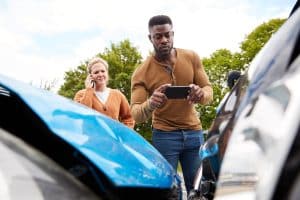Gathering Evidence at the Scene of a Houston Car Accident

Gathering evidence at the scene of a car accident is essential for several reasons. First, evidence can help determine who was at fault for the accident. This is important because determining fault can have significant legal and financial implications. For example, if you were not at fault for the accident, you may be entitled to compensation for your injuries and other losses. However, if you were at fault for the accident, you may be liable for the other party’s injuries and damages.
Second, evidence can help support your insurance claim. When you file an insurance claim, the insurance company will want to see evidence that supports your version of events. If you do not have evidence to support your claim, the insurance company may deny your claim or offer you a lower settlement amount.
Finally, gathering evidence can help your Houston personal injury attorney build a strong case if you decide to pursue legal action. If you were injured in the accident and want to pursue a personal injury claim, your attorney will need evidence to prove your case in court. Without evidence, it may be challenging to convince a judge or jury that you deserve compensation for your injuries and other losses.
What evidence should I collect after a car accident?
Now that you understand why gathering evidence is important, let’s discuss what evidence you should collect at the scene of a car accident in Houston. Here are some essential pieces of evidence to gather:
Contact information of all parties involved
The first piece of evidence you should gather is the contact information of all parties involved in the accident. This includes the name, address, phone number, and email address of the other driver(s) and any witnesses to the accident. Don’t forget license plates and driver’s licenses as well. You can get this information from the police report later, but it’s also handy to have on your own. This information will be important for insurance purposes and if you decide to pursue legal action.
Insurance information of all parties involved
In addition to contact information, you should also collect the insurance information of all parties involved in the accident. This includes the name of the insurance company, the policy number, and the agent’s name and phone number. This information will be used to file an insurance claim and determine who will be responsible for paying for damages and injuries.
Pictures of the accident scene and vehicles involved
Pictures of the accident scene can provide critical evidence to support your claim. Take pictures of the damage to all vehicles involved in the accident, including the position of the vehicles after the accident. You should also take pictures of any skid marks, debris, or other evidence of the accident. Include weather conditions or things like sun glare.
Witness statements
If there were witnesses to the accident, you should collect their contact information and ask them to provide a quick statement. You can even use the video app on your smartphone. Ask them to describe what they saw and heard leading up to the accident and immediately after. Witness statements can be powerful evidence in a personal injury case.
Police report
Ensure you call the police to the scene so they will file a police report. This report will contain important information, such as the time and location of the accident, a description of the accident, and the names of all parties involved. Be sure to obtain a copy of the police report as it can be valuable evidence to support your claim.
Medical records
If you were injured in the accident, you should seek medical attention right away. Your medical records can provide valuable evidence of your injuries, the treatment you received, and the cost of your medical care. Be sure to keep all medical records related to the accident, as you will need them for your personal injury claim.
It is essential to gather evidence as soon as possible after your Houston car accident. Remember, memories fade, and evidence can disappear quickly, so it is critical to act fast. If you are not able to gather evidence at the scene of the accident – for example, you may be seriously injured – you should try to gather as much information as possible as soon as you can.
In addition to gathering evidence, it is also important to avoid discussing fault or apologizing at the scene of the accident.
After any type of car accident causing injury, it’s essential to seek legal advice from an experienced personal injury lawyer. An attorney can help you understand your legal rights, gather evidence to support your case, and negotiate with insurance companies to help you get the compensation you deserve.
Gathering evidence at the scene of a car accident is crucial for determining fault, supporting insurance claims, and building a strong personal injury case. By collecting contact and insurance information, taking pictures, obtaining witness statements and police reports, and keeping medical records, you can ensure that you have the evidence you need to support your case.
If you were injured in a car accident, you should talk to an experienced Houston car accident lawyer at The Kishinevsky Law Firm today. We can help you seek the compensation to which you’re entitled for your injuries and losses. Just call our offices or complete our contact form to schedule a free initial consultation today.

Houston personal injury lawyer Rashmi Parthasarathi represents clients in personal injury claims and has spent several years representing clients in product liability cases who were injured by pharmaceutical and medical device companies who put profits before safety of their products. In January 2020, Rashmi Parthasarathi joined the Kishinevsky Law Firm where she continues working to help clients harmed by the wrongful acts of others to obtain justice, especially individuals being taken advantage of by insurance companies and other large corporations.
